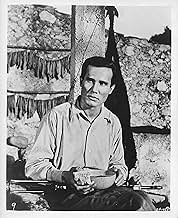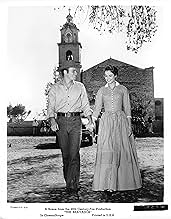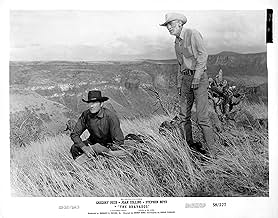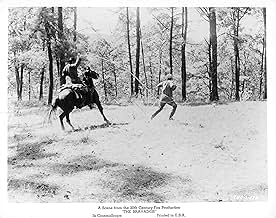AVALIAÇÃO DA IMDb
7,0/10
6,9 mil
SUA AVALIAÇÃO
Um homem persegue quatro bandidos que mataram sua esposa e os encontra em uma cadeia de uma pequena cidade, mas eles fogem para o México.Um homem persegue quatro bandidos que mataram sua esposa e os encontra em uma cadeia de uma pequena cidade, mas eles fogem para o México.Um homem persegue quatro bandidos que mataram sua esposa e os encontra em uma cadeia de uma pequena cidade, mas eles fogem para o México.
- Prêmios
- 1 vitória e 1 indicação no total
Ninos Cantores de Morelia Choral Group
- Choir
- (as The Niños Cantores De Morelia Choral Group)
Robert Adler
- Tony Mirabel
- (não creditado)
Beulah Archuletta
- Mexican Waitress
- (não creditado)
Ada Carrasco
- Sra. Parral
- (não creditado)
Alicia del Lago
- Ángela Luján
- (não creditado)
- Direção
- Roteiristas
- Elenco e equipe completos
- Produção, bilheteria e muito mais no IMDbPro
Avaliações em destaque
This late Henry King movie is one of his most under-rated films. It's a revenge western, powerfully scripted by Philip Yordan and directed with commendable restraint by King. Gregory Peck, (at his most stoic), is the rancher bent on bringing to justice the four men he believes raped and killed his wife. The men are a leering Stephen Boyd, Albert Salmi, Henry Silva and an over-excitable Lee Van Cleef. Joan Collins, by this time entrenched in her first American sojourn, is in there, too, but she's the weakest thing in the film. There is a crisis of conscience and a spiritual reawakening to be reckoned with and the film does pose some interesting questions of morality but there's tension and the pleasures that come from a good western, as well. One for rediscovery.
This is an interesting Western which, as is often the case in this genre, is a tale of revenge. This time, however, there are a few ironical twists. Under the solid hand of director Henry King, this film takes further the point made in OXBOW INCIDENT in 1943, about lynching.
In this case, you have the main character, Jim Douglas (Peck) seeking revenge for the rape and brutal murder of his wife. Peck, in one of his finest performances, portrays a generally balanced and good man driven somewhat over the edge by a desire for revenge. The four "baddies" are all played with considerable zest by Stephen Boyd, Henry Silva, Lee van Cleef and Salmi. The weakest part of the film is Joan Collins. Tough for me to understand why and how she got this role.
Silva, portraying an Indian, correctly identifies Douglas as a hunter. It is Douglas' sad failing that he gets the wrong culprits, and even more so that he thought the real rapist and murderer a good man, who would not hurt anyone.
Douglas ends the film with a tormented conscience for killing three men who were innocent of his charges, but he receives great applause from the local community, grateful to see the town rid of a gang of thieves. The irony of the situation is put across without any moralizing, which adds to the film's virtues.
There are a few unnecessary touches along the way, such as Boyd raping an abductee, but by and large it is a tightly told story, helped by very good cinematography.
In this case, you have the main character, Jim Douglas (Peck) seeking revenge for the rape and brutal murder of his wife. Peck, in one of his finest performances, portrays a generally balanced and good man driven somewhat over the edge by a desire for revenge. The four "baddies" are all played with considerable zest by Stephen Boyd, Henry Silva, Lee van Cleef and Salmi. The weakest part of the film is Joan Collins. Tough for me to understand why and how she got this role.
Silva, portraying an Indian, correctly identifies Douglas as a hunter. It is Douglas' sad failing that he gets the wrong culprits, and even more so that he thought the real rapist and murderer a good man, who would not hurt anyone.
Douglas ends the film with a tormented conscience for killing three men who were innocent of his charges, but he receives great applause from the local community, grateful to see the town rid of a gang of thieves. The irony of the situation is put across without any moralizing, which adds to the film's virtues.
There are a few unnecessary touches along the way, such as Boyd raping an abductee, but by and large it is a tightly told story, helped by very good cinematography.
This is a smart western, it is not about the hero quick-drawing against four anonymous opponents at the same time, it is about moral.
For quite some time, you are not sure exactly where the movie is heading. The beginning is slow, with the goal to present the hero (Peck). He is doing just about the same silent, dry western hero as in "The Gunfighter". But the tempo goes up and the plot reveals, step by step. We get very convinced that the four criminals are quite bad men, and the worst is clearly the ruthless Bill (Stephen Boyd), ready for rape and murder any time it suits him.
Joan Collins, however, is mostly annoying, subject of an implied love story that the movie fortunately doesn't go deeper into. She has little importance to the story. It seems she is there only to tack on a touch of romance.
The movie manages to make each and every one of the bad guys (six of them if you count right) sharp and live, we get to know them. We also get to know a few others. The most famous villain actor here is clearly Lee van Cleef, who makes a great job as Parral, but the best character actor is really Joe DeRita (one of the Three Stooges) as Tucker/Simms, who is, incredibly, uncredited despite his fairly big role, central to the story. This means that both casting and script are very good, the script gives room for acting and the actors are capable of delivering.
From an action/western perspective, the movie fails on one thing: It could make more dramatic endings when people are killed, spend a little more time on their last seconds so we kind of follow them down. Now, a death is too much like flipping a switch. We don't have to use slow-motion every time, but a second or two extra would have helped in some places. In some cases, I feel that the movie really doesn't want to show too much violence and blood, but in at least two occasions it isn't that simple, it looks rather like if the director or producer was careless with some important scenes. These all to obvious mistakes lower the total a bit, but they don't ruin the movie, it just takes it below the absolute top.
But what the movie doesn't fail in is to deliver a message, a message of right and wrong, life and death, who has the right to kill. This is where it shines. After all is said and done, you find that there is still a lot more to say, more to think about, and the movie stays with me a lot longer than the average western where the difference between right and wrong is obvious and crystal clear.
For quite some time, you are not sure exactly where the movie is heading. The beginning is slow, with the goal to present the hero (Peck). He is doing just about the same silent, dry western hero as in "The Gunfighter". But the tempo goes up and the plot reveals, step by step. We get very convinced that the four criminals are quite bad men, and the worst is clearly the ruthless Bill (Stephen Boyd), ready for rape and murder any time it suits him.
Joan Collins, however, is mostly annoying, subject of an implied love story that the movie fortunately doesn't go deeper into. She has little importance to the story. It seems she is there only to tack on a touch of romance.
The movie manages to make each and every one of the bad guys (six of them if you count right) sharp and live, we get to know them. We also get to know a few others. The most famous villain actor here is clearly Lee van Cleef, who makes a great job as Parral, but the best character actor is really Joe DeRita (one of the Three Stooges) as Tucker/Simms, who is, incredibly, uncredited despite his fairly big role, central to the story. This means that both casting and script are very good, the script gives room for acting and the actors are capable of delivering.
From an action/western perspective, the movie fails on one thing: It could make more dramatic endings when people are killed, spend a little more time on their last seconds so we kind of follow them down. Now, a death is too much like flipping a switch. We don't have to use slow-motion every time, but a second or two extra would have helped in some places. In some cases, I feel that the movie really doesn't want to show too much violence and blood, but in at least two occasions it isn't that simple, it looks rather like if the director or producer was careless with some important scenes. These all to obvious mistakes lower the total a bit, but they don't ruin the movie, it just takes it below the absolute top.
But what the movie doesn't fail in is to deliver a message, a message of right and wrong, life and death, who has the right to kill. This is where it shines. After all is said and done, you find that there is still a lot more to say, more to think about, and the movie stays with me a lot longer than the average western where the difference between right and wrong is obvious and crystal clear.
It's very odd that Gregory Peck is not often associated with Westerns--even though many of his best movies stand among the finest examples of the genre. Considering the number of Westerns he made, most of them were highly successful and entertaining. Remember, this is the same man who starred in THE BIG COUNTRY, THE GUNFIGHTER and YELLOW SKY--yet he is more commonly seen as an actor in contemporary dramas. THE BRAVADOS is yet another in a long string of hits, as it somehow manages to transcend a genre that often seems derivative.
In this film, Peck plays a complex character--neither a villain nor a hero. He has been on a relentless pursuit to kill the men who he is convinced killed his wife--and like Captain Ahab, he won't give up or consider and options other than their deaths. Along the way, he stumbles up a young and very beautiful Joan Collins--in one of her better screen roles.
I really don't want to tell you more, as it would spoil the plot, but rest assured it is masterfully made like other Peck Westerns and one not to be missed.
In this film, Peck plays a complex character--neither a villain nor a hero. He has been on a relentless pursuit to kill the men who he is convinced killed his wife--and like Captain Ahab, he won't give up or consider and options other than their deaths. Along the way, he stumbles up a young and very beautiful Joan Collins--in one of her better screen roles.
I really don't want to tell you more, as it would spoil the plot, but rest assured it is masterfully made like other Peck Westerns and one not to be missed.
"Los Bravados" proves that Henry King totally mastered the western style among many others.Much more interesting than his precedent effort "the sun also rises",this work casts Peck as a desperate man eager to take revenge of four outlaws who killed and raped his wife. he arrives in the town where the criminals -or rather the men he thinks are the criminals- are to be hanged.
The first thirty minutes are the more convincing.The soundtrack is particularly remarkable:first we hear the hammers of the men building the scaffold;often there's no music at all and this ominous noise creates an agonizing atmosphere.Then ,later,the whole congregation attends the service in a baroque church and the canticles provides the movie with an even more sinister soundtrack.The editing shows in parallel the outlaws' escape and the people praying in the church where Peck gazes upon a madonna and her child:this picture will frequently come back in the movie as a leitmotiv:it's the image of forgiveness.
Because what makes this western worthwhile is the absurdity of the vengeance it depicts.Once a victim,the hero becomes a criminal.But as the priest says ,a lot of people kill and they do not feel any remorse. King's obsession seems to be the reconstruction of the family as well:Peck and his little girl with Collins ,and the half-breed who succeeded in convincing him that he's not responsible for his misfortune.And anyway ,for this director whose body of work stretches on 50 years ,forgiveness and love are many-splendored things.
The first thirty minutes are the more convincing.The soundtrack is particularly remarkable:first we hear the hammers of the men building the scaffold;often there's no music at all and this ominous noise creates an agonizing atmosphere.Then ,later,the whole congregation attends the service in a baroque church and the canticles provides the movie with an even more sinister soundtrack.The editing shows in parallel the outlaws' escape and the people praying in the church where Peck gazes upon a madonna and her child:this picture will frequently come back in the movie as a leitmotiv:it's the image of forgiveness.
Because what makes this western worthwhile is the absurdity of the vengeance it depicts.Once a victim,the hero becomes a criminal.But as the priest says ,a lot of people kill and they do not feel any remorse. King's obsession seems to be the reconstruction of the family as well:Peck and his little girl with Collins ,and the half-breed who succeeded in convincing him that he's not responsible for his misfortune.And anyway ,for this director whose body of work stretches on 50 years ,forgiveness and love are many-splendored things.
Você sabia?
- CuriosidadesWhile filming, Gregory Peck decided to become a cowboy in real life, and he purchased a vast working ranch near Santa Barbara, California, already stocked with six hundred head of prize cattle.
- Erros de gravaçãoBesides the vast size of the little town's church, they have a prepubescent boys choir of 50, in matching white robes, who themselves could amount to almost half the town's population.
- Citações
Jim Douglass: You're wasting a lot of good lumber. A tree does just as well.
Sheriff Sanchez: They were sentenced to be hanged - not lynched!
- ConexõesEdited into Voskovec & Werich - paralelní osudy (2012)
Principais escolhas
Faça login para avaliar e ver a lista de recomendações personalizadas
- How long is The Bravados?Fornecido pela Alexa
Detalhes
- Tempo de duração
- 1 h 38 min(98 min)
- Proporção
- 2.35 : 1
Contribua para esta página
Sugerir uma alteração ou adicionar conteúdo ausente



































